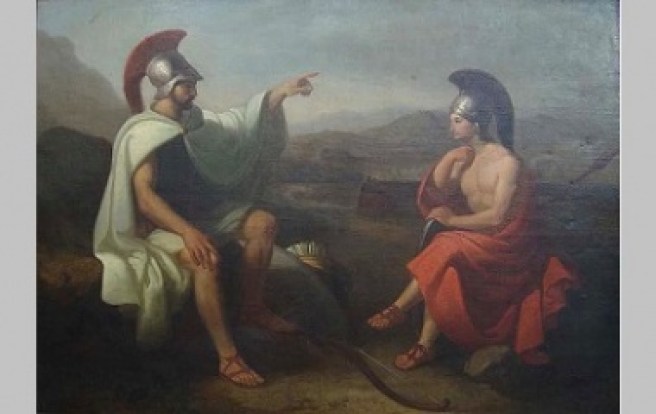In her introduction to the Penelopiad, Margaret Atwood notes that two lingering questions from the Odyssey inspired her– (1) the ancient question of what Penelope was up to (during Odysseus’ absence and in the Odyssey itself where many have seen her toying with the suitors, recognizing Odysseus ahead of time, etc. and (2) the brutal savagery of the slaughter of the handmaids who allegedly gave comfort to the suitors. The epic implies, I think, that Odysseus is tyrannical with his mutilation of Melanthios, but its presentation of the hanging of the maids is far more ambiguous and challenging to explain/defend/contextualize for students (or for myself). In preparation for a lecture on the Odyssey and the Penelopiad, I revisit this passage.
Homer Odyssey, 22.446-73
“So he spoke and all the women came in close together,
Wailing terribly, shedding growing tears.
First, they were carrying out the corpses of the dead men,
and they put them out under the portico of the walled courtyard
stacking them against one another. Odysseus himself commanded
as he oversaw them—they carried out the bodies under force too.
Then, they cleaned off the chairs and the preciously beautiful trays
With water and much-worn sponges.
Meanwhile Telemachus, the cowherd and the swineherd
were scraping up the close-fit floors of the home
with hoes—the maids were carrying the remnants to the ground outside.
Then, when they had restored the whole house to order,
They led the women out of the well-roofed hall,
Halfway between the roof and the courtyard’s perfect wall,
Closing them in a narrow space were there was no escape.
Among them, learned Telemachus began to speak.
“May I not rip the life away from these women with a clean death,
These women who poured insults on my head and my mother
These women who were stretching out next to the suitors”
So he spoke. After attaching a ship’s cable to a pillar he bound it around
The dome of the house and stretched it up high
so that no one could be able to touch the ground with feet.
Just as when either thin-winged thrushes or doves
step into a snare which has been set in a thicket,
as they look for a resting plate, a hateful bed receives them—
Just so the women held their heads in a line, and nooses
fell around every neck so that they would die most pitiably.
They were gasping, struggling with their feet a little bit, but not for very long.”
ὣς ἔφαθ’, αἱ δὲ γυναῖκες ἀολλέες ἦλθον ἅπασαι,
αἴν’ ὀλοφυρόμεναι, θαλερὸν κατὰ δάκρυ χέουσαι.
πρῶτα μὲν οὖν νέκυας φόρεον κατατεθνηῶτας,
κὰδ δ’ ἄρ’ ὑπ’ αἰθούσῃ τίθεσαν εὐερκέος αὐλῆς,
ἀλλήλοισιν ἐρείδουσαι· σήμαινε δ’ ᾿Οδυσσεὺς
αὐτὸς ἐπισπέρχων· ταὶ δ’ ἐκφόρεον καὶ ἀνάγκῃ.
αὐτὰρ ἔπειτα θρόνους περικαλλέας ἠδὲ τραπέζας
ὕδατι καὶ σπόγγοισι πολυτρήτοισι κάθαιρον.
αὐτὰρ Τηλέμαχος καὶ βουκόλος ἠδὲ συβώτης
λίστροισιν δάπεδον πύκα ποιητοῖο δόμοιο
ξῦον· ταὶ δ’ ἐφόρεον δμῳαί, τίθεσαν δὲ θύραζε.
αὐτὰρ ἐπεὶ δὴ πᾶν μέγαρον διεκοσμήσαντο,
δμῳὰς ἐξαγαγόντες ἐϋσταθέος μεγάροιο,
μεσσηγύς τε θόλου καὶ ἀμύμονος ἕρκεος αὐλῆς,
εἴλεον ἐν στείνει, ὅθεν οὔ πως ἦεν ἀλύξαι.
τοῖσι δὲ Τηλέμαχος πεπνυμένος ἦρχ’ ἀγορεύειν·
“μὴ μὲν δὴ καθαρῷ θανάτῳ ἀπὸ θυμὸν ἑλοίμην
τάων, αἳ δὴ ἐμῇ κεφαλῇ κατ’ ὀνείδεα χεῦαν
μητέρι θ’ ἡμετέρῃ, παρά τε μνηστῆρσιν ἴαυον.”
ὣς ἄρ’ ἔφη, καὶ πεῖσμα νεὸς κυανοπρῴροιο
κίονος ἐξάψας μεγάλης περίβαλλε θόλοιο,
ὑψόσ’ ἐπεντανύσας, μή τις ποσὶν οὖδας ἵκοιτο.
ὡς δ’ ὅτ’ ἂν ἢ κίχλαι τανυσίπτεροι ἠὲ πέλειαι
ἕρκει ἐνιπλήξωσι, τό θ’ ἑστήκῃ ἐνὶ θάμνῳ,
αὖλιν ἐσιέμεναι, στυγερὸς δ’ ὑπεδέξατο κοῖτος,
ὣς αἵ γ’ ἑξείης κεφαλὰς ἔχον, ἀμφὶ δὲ πάσαις
δειρῇσι βρόχοι ἦσαν, ὅπως οἴκτιστα θάνοιεν.
ἤσπαιρον δὲ πόδεσσι μίνυνθά περ, οὔ τι μάλα δήν.
Eustathius, Comm. Ad Od. II 290
“It is clear from the words uttered that the father ordered one thing but the son ordered another. For since it seems that a clean death is from a sword, and an unclean one is hanging, as is clear from the Nekyia, he thought it was right that unclean women should not have a clean death, since they were not clean themselves nor did they leave their masters clean of insults.”
δῆλον δ’ ἐκ τῶν ῥηθέντων ὅτι ἄλλο μὲν ἐκέλευσεν ὁ πατὴρ, ἄλλο δὲ πεποίηκεν ὁ υἱός. ἐπεὶ γὰρ καθαρὸς μὲν ὁ διὰ ξίφους ἐδόκει θάνατος, μιαρὸς δὲ ὁ ἀγχονιμαῖος, ὡς ἐν τῇ νεκύᾳ προδεδήλωται, ἔκρινε μὴ χρῆναι καθαρῷ θανάτῳ τὰς ἀκαθάρτους πεσεῖν, αἳ οὔτε αὐταὶ καθαραὶ ἦσαν οὔτε τοὺς δεσπότας καθαροὺς εἴων ὕβρεων.






